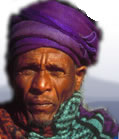THEMES IN THIS
TESTIMONY
Agriculture

Communications

Development

Economics

Education

Environment

Family Life

Food Security

Gender

Health

Identity

Land

Population

Social Institutions

Social Relationships

Spiritual Beliefs

Click on arrows
to find more
testimonies
featuring
these themes
|
|
Sex
|
male
|
|
|
Age
|
37
|
|
|
Occupation
|
farmer
|
|
|
Location
|
(midlands)
|
|
|
Date
|
E
|
|
summary
detailed breakdown
|
You will need a password from Panos to view the full
transcript of the interview. To apply for a password, click here.
Once you have a password, click here to go to the beginning
of the transcript. You can also click on any section of the
breakdown of content below and go straight to the
corresponding part of the transcript.
|
| Section 1 |
Poor management of land and decrease in livestock. Changes in farming methods; usefulness of new technology and agricultural education brought by extension workers.
|
| Section 2 |
Increase in cost of living. Irrigation, new crops, use of pesticides. Development activities – schools and clinics being built, better roads, veterinary services. If these continue he believes “we can achieve revolutionary changes within the coming 20 years”.
Changes in marriage and divorce – formerly decided by parents and elders, now by young people.
|
| Section 3 |
Traditional (church) education. Modern education – enables children to support their parents.
Interaction among the different social groups, i.e. Muslim and Christian: “Since the people live in the same area and share the same language and culture, they are not evil to each other.”
Views on reasons for crime – most due to trivial matters; importance of arbitration to settle quarrels.
Men and women: “women have proved themselves to be equally productive in work and as educated as men.”
|
| Section 4 |
Disabled people – not being given training to enable them to be self-sufficient.
Characteristics of Meket people: religious, hospitable. Good and bad traditions. Institution of marriage – major changes.
The value of education.
|
| Section 5 |
Impact of the Chinese road – opening up the way for development, including tourism.
|
| Section 6-7 |
Health services more effective than traditional methods: “The witch doctors prescribed red or white chicken and the man was not cured often. Now people have realised that the modern doctors are more effective.” Illnesses, past and present; AIDS. Population growth and ignorance of family planning.
Why famine occurs: “ due to lack of knowledge and the inability to use the local plants”.
|
|


